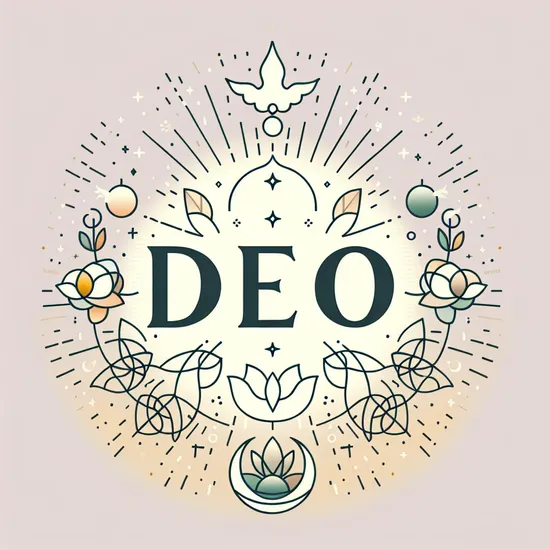Dea - Meaning, Origin, Popularity and Global Usage
Understanding the Meaning of Dea
The name Dea carries the beautiful meaning of 'goddess' or 'divine', derived from its Latin roots. It symbolizes qualities of purity and celestial beauty. In various cultures, Dea is associated with grace and nobility, often viewed as someone possessing a strong spiritual presence. Its interpretation across different languages and contexts often retain these elements of divinity and elegance.
Find more names related to the name Dea.
Goddess,
Divine,
Grace,
Latin,
Roman,
How to Pronounce Dea in Latin
ˈde.a - Dea
- /ˈd/: as in 'day'
- /e/: short 'e' as in 'met'
- /a/: 'a' as in 'car'
Pronounced as "DAY-a", where the 'e' is brief and the 'a' has a relaxed open sound similar to 'ah'.
Tracing the Origin of Dea
The name Dea originates from the ancient Latin language, where it means 'goddess'. It reflects a rich historical heritage connected to Roman and early Christian contexts. As Latin was a prominent language of scholarship and religious texts, the name Dea has been passed down and adapted across various cultures, maintaining its elegant and profound connotations through time.
Gender Flexibility of Dea
The name Dea is predominantly female, often used to convey a sense of elegance and grace. However, in some cases, it has been adopted as a gender-neutral name in modern contexts. In countries like Italy and Spain, Dea remains primarily female, whereas in global usage, its appeal transcends gender barriers occasionally. Notably, there are various female public figures named Dea who highlight its wider acceptance.
Popularity Trends of Dea
Globally, the name Dea enjoys moderate popularity. It's frequently seen in baby name rankings in countries like Italy and Albania, with occasional appearances in the U.S. charts. Its usage has been consistent over recent decades, particularly within Latin-influenced cultures. Though not among the top baby names, it retains a timeless elegance bringing it a steady flow of interest over generations.
Global Usage of the Name Dea
The name Dea is popular in countries such as Italy, Albania, and Romania. While it has a consistent pronunciation, variations may occur in regional dialects. In English-speaking regions, it remains a unique and exotic name choice, whereas in Romance languages it tends to be more readily recognized and conveyed with traditional roots.
| Global Distribution and Gender Ratio of the Name Dea |
| Country |
Usage % |
Female % |
Male % |
|
Indonesia |
73.95% |
91.97% |
8.03% |
|
Brazil |
5.48% |
97.5% |
2.5% |
|
United States |
4.02% |
95.45% |
4.55% |
|
Philippines |
2.42% |
98.11% |
1.89% |
|
Malaysia |
2.19% |
91.67% |
8.33% |
Analysis of gender and popularity by region is drawn from the data provided by
Gender API.
Characteristic Features of Dea
- Graceful : Often associated with elegance and charm.
- Spiritual : Strong connections to spiritual or divine elements.
- Elegant : Generally implies refined taste and sophistication.
- Noble : Having qualities that align with dignity and honor.
Professional Orientation for Dea
- Creative Arts : Often inclined toward artistic fields like painting, dancing, or music.
- Leadership Roles : Tendency to excel in managerial or leading positions.
- Spiritual Guidance : Sometimes drawn to professions in spiritual or religious sectors.
- Social Work : Inclined to engage in community and help-oriented professions.
Unique Characteristics of the Name Dea
- Mythological Reference : The name's meaning connects deeply to mythology and goddess references.
- Latin Roots : Its historical relevance comes from ancient Rome and early Christianity.
- Cultural Depictions : Featured in various artistic and literary works symbolizing purity.
- Instrumental Associations : Often used in song lyrics or titles capturing its melodic tone.
Famous People Named Dea
- Dea Norberg: Swedish singer and backing vocalist.
- Dea Birkett: An author and journalist known for her non-fiction work.
Similar Names Related with the Name Dea
-
Diana: Shares a similar celestial and divine theme, often associated with the Roman goddess of the hunt. Goddess
-
Dina: A variant found in various cultures, symbolizing judgment or just.
-
Deanne: Often interpreted as a nurturing figure akin to a divine presence. Divine
-
Devin: Phonetically similar with meanings tied to poet or divinity in Celtic origins.
-
Dana: A flexible name with gender-neutral usage; its meanings include wise in Irish traditions.
-
Delia: Typically linked to Greek origins where it connotes from Delos, centered around divine roots.
-
Deanna: With meanings tied to 'divine' or 'heavenly,' it echoes similar attributes. Divine
-
Debra: Biblical roots meaning 'bee', symbolically related to industrious and divine roles. Bee
-
Dahlia: A flower symbolizing elegance and dignity, akin to beauty and grace.
-
Dinah: A biblical name, often interpreted as just or vindicated.
Frequently Asked Questions About the Name Dea
-
What does the name Dea mean?
The name Dea means 'goddess' or 'divine', signifying purity and spiritual presence.
-
What is the origin of the name Dea?
Dea originates from Latin, historically tied to Roman goddess connotations.
-
Is Dea a male or female name?
Dea is predominantly a female name but is considered gender-neutral in some modern contexts.
-
How popular is the name Dea?
Dea has moderate popularity, especially in Italy and Albania, with steady interest over recent years.
-
How is the name Dea used globally?
Globally, Dea is used predominantly in Romance languages, retaining variations in pronunciation.
-
What careers are best suited for someone named Dea?
People named Dea often gravitate towards creative arts, leadership roles, and community-oriented professions.
-
What are some names similar to Dea?
Similar names include Diana, Devin, Dana, Dahlia, and Deanna, sharing divine or elegant characteristics.
-
How is Dea pronounced?
Dea is pronounced 'DAY-a', with 'e' being brief and 'a' resonating as 'ah'.
-
Are there famous people named Dea?
Yes, such as Dea Norberg, a Swedish singer, and Dea Birkett, an author and journalist.
